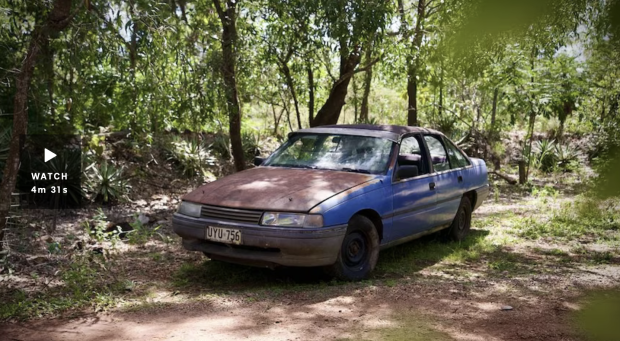April 20, 2023
Last Cab to Darwin Taxi Recovered on Philip Nitschke’s Bush Block
Last Cab to Darwin Taxi Recovered on Philip Nitschke’s Bush Block
Max Bell’s life ended miserably on a Broken Hill hospital bed.
It wasn’t the exit the former cab driver had wanted: in fact, it was one he’d driven more than 3,000 kilometres through the centre of Australia, woefully sick behind the wheel, to try to avoid at all costs.
The tough-as-old-boots cabbie had hoped to go out on his own terms, calmly, quickly, not crammed with tubes as his insides were corroded away by the aggressive terminal cancer in his guts.
Regardless, it would prove to be his fate — but before he died, Mr Bell gave to a doctor with whom he’d found empathy one of his few worldly possessions: his taxi.
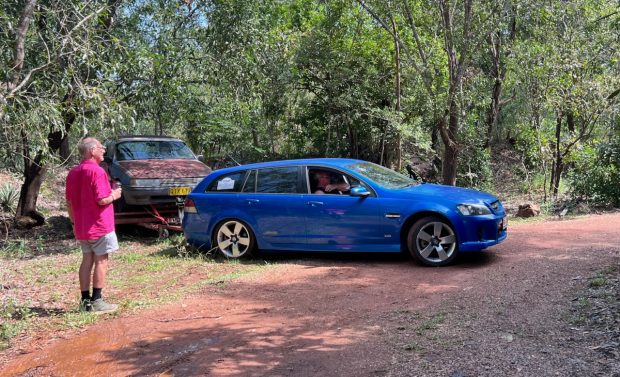
Max Bell drove his taxi to Darwin in 1996 to use the Rights of the Terminally Ill Act to die.
A bush block recovery
That was 1996.
It’s now 2023 and, 27 years since Mr Bell drew his last breath, Philip Nitschke is digging through boxes at his bush block on Darwin’s outskirts, trying to differentiate between trash and treasure.
The former physician’s colourful, 75-year history presents itself in a universe of paraphernalia out here between the pandan trees: a political corflute from when he ran as an independent.
There are photos from his days as a park ranger.
And pamphlets upon pamphlets on the topic for which Dr Nitschke is known around the world — voluntary euthanasia — or, in today’s parlance, voluntary assisted dying.
He’s even kept the laminated newspaper posters branding him by his infamous tabloid nickname: “Doctor Death.”
Dr Nitschke was the doctor Mr Bell had bequeathed his taxi to, and for years the blue Commodore had lain out the back of his property, slowly peeling to rust under the Top End sun.
No longer practising, Dr Nitschke renounced his medical certificate dramatically in 2015.
“The cab that became known as the Last Cab To Darwin,” the pro-euthanasia advocate says now.
“It was a cab that was driven here by a man who was dying from stomach cancer, a taxi driver from Broken Hill who heard about this new law, this world-first law, coming in on the 1st of July, 1996.
“And he said – ‘I really think that law might help me’ – because he was in a bad way.”
On Australia’s tropical frontier, the Northern Territory government had just announced it was making the shock move to legalise voluntary euthanasia.
With death lurking, and with Dr Nitschke’s assurances that he’d be able to access the new law, Mr Bell packed up his small home in Broken Hill and prepared to make the epic dash north.
Right-to-die legislation … what’s next?
The Northern Territory sparked global controversy in the 1990s when it became the first place in the world to legalise euthanasia. Then, the federal government overturned it. But that all changed yesterday.
He saw a chance to escape his personal suffering.
“Max said, ‘alright, I’m gonna drive to Darwin’,” Dr Nitschke says.
“I said, ‘Drive? It’s 3,000 kilometres!’ and he said, ‘I know, I know how big Australia is, and I’m gonna drive it. And if I don’t get there, what does it matter?’
“And it was a good point. And so he did. He set off.”
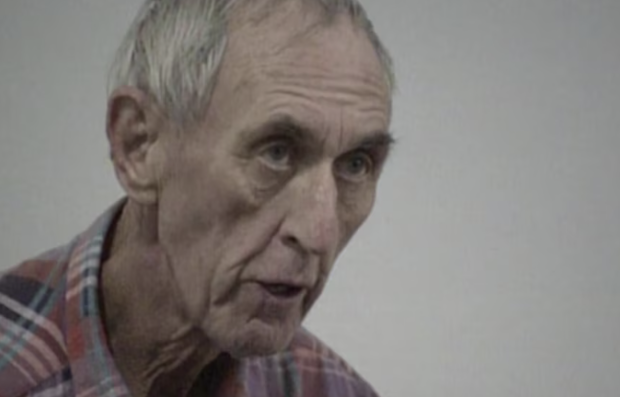
No Hollywood ending for Max Bell
Mr Bell’s journey north to end his life via legal voluntary euthanasia was captured in a play, and later on the big screen in 2015, in Last Cab To Darwin.
In the film, the character based on Mr Bell was played by Michael Caton, of The Castle fame, as the ailing cabbie took a road trip through the heart of the outback, falling into misadventures along the way.
These versions of events never sat completely comfortably with Dr Nitschke, who believed they romanticised the dreadful reality of Mr Bell’s condition by the time he’d reached his destination.
When Max Bell arrived in Darwin, doctors would not sign paperwork allowing him access to right to die laws.(ABC News)
“Max drove into town to use the law — he’d made the journey and he got here,” Dr Nitschke says.
“I didn’t think he’d get here, but he did … he effectively vomited his way north, he had a bucket alongside him in the cab — a very, very sick man.”
Last Cab to Darwin Taxi Recovered on Philip Nitschke’s Bush Block
For all intents and purposes, Max Bell was ready to go. His stomach was in ravages, he was terribly crook, and he was hopeful that Dr Nitschke could help him get his voluntary exit underway.
What the Broken Hill cabbie didn’t know, however, was that he had driven into a storm.
The Australian Medical Association had fired off a legal challenge against the fledgling law, which threatened possible repercussions on doctors who attempted to use it — and the territory’s close-knit medical fraternity had been left spooked.
Max Bell’s blue Commodore has been immortalised in both theatre and screen productions.(ABC News: Hamish Harty)
Dr Nitschke was the only doctor prepared to help Mr Bell take steps towards ending his life.
“I needed three other doctors besides myself,” Dr Nitschke says.
“We needed four signatures on a piece of paper with that world-first piece of legislation that [former NT chief minister] Marshall Perron had brought in — and I couldn’t get one.
“I couldn’t find a single doctor who would go and see Max and sign his papers.
“They didn’t have to agree with his decision to die, they simply had to agree that he was terminally ill — and you could see that at 25 metres.
“It was just the most discouraging time.”
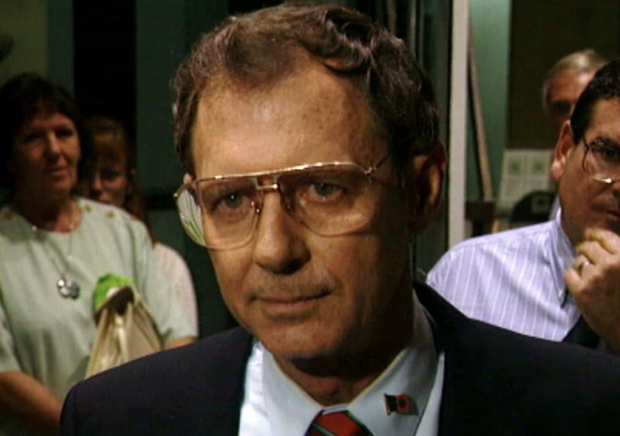
Former NT chief minister Marshall Perron passed voluntary euthanasia laws in the 1990s.(ABC News)
Disheartened, and on death’s door, Max Bell realised it wasn’t going to be.
He climbed into his blue taxi and drove the 3,134 kilometres back to Broken Hill.
A spotlight on Max’s journey
The ABC was shooting a Four Corners episode on the Northern Territory’s move to legalise voluntary euthanasia when the reporter leading the investigation, Murray McLaughlin, found out about Max Bell.
“After his presence was revealed, Max very much became the focus of that story,” the former veteran journalist and ABC Darwin news editor says now.
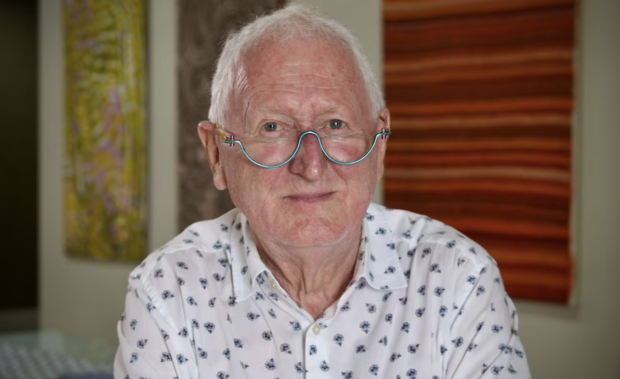
Murray McLaughlin led the ABC’s reporting on the NT’s push for voluntary euthanasia in the 90s.(ABC News: Hamish Harty)
Max Bell would ultimately drive back to Broken Hill when his trip to Darwin didn’t turn out as planned.
The Four Corners team interviewed an ailing Mr Bell in Darwin, witnessed his rejection, then charted the end of his journey after he travelled back to his New South Wales hometown.
“It was a tragic story,” McLaughlin says.
“Max died a miserable death in Broken Hill. He went back there and became a patient at Broken Hill hospital and it was his worst nightmare realised.
“I’m sure the treatment there was as kind as it could’ve been, but Max had wanted a quick and easy exit — he never got it, and he died miserably at Broken Hill.”
However, Mr Bell’s plight didn’t fall on deaf ears.
Last Cab to Darwin Taxi Recovered on Philip Nitschke’s Bush Block
Once the ABC’s Four Corners program aired on national television, something stirred.
Seeing Mr Bell’s sad circumstance in the spotlight triggered a Darwin surgeon — John Wardill — to come on board and assist those wanting to end their suffering from terminal illness.
Parliament lifts ban on territory euthanasia laws
The Commonwealth imposed the veto on the Northern Territory and the ACT in 1997, but the Senate has now voted to remove it.
Two more specialists soon followed.
“When the program went to air, there was one specialist in town who was so ashamed on behalf of his profession, that they’d ignored Max’s pleas for help, that he volunteered,” McLaughlin says.
“Although Max himself wasn’t able to avail himself of that specialist’s signature, the first person to die [of legalised euthanasia] certainly was.”
Just months after Mr Bell’s death, Bob Dent became the first person to legally access voluntary euthanasia in the world, under the NT’s landmark legislation.
Three more people would follow before the law was shut down by the conservative federal government and the Northern Territory was banned from legalising the issue for decades.
Bob Dent’s wife, Judy Dent, has said the former NT law offered her late husband relief from his suffering.
A bittersweet legacy
Now, across Australia, every state has legalised voluntary assisted dying in some capacity.
The ban on the territories was also overturned last year, meaning that the ACT and Northern Territory parliaments are now also allowed to vote on whether to legalise the issue.
In a bid to help tell Australia’s euthanasia history properly, via the bittersweet story of Max Bell, Dr Nitschke has offered the donation of his taxi to the Northern Territory Museum and Art Gallery.
The museum’s curator of Northern Territory history, Jared Archibald, has been assessing the vehicle for the museum’s collection and says regardless of its eventual decision, it remained an important artefact.
“As a museum, we love objects to tell stories, and this tells a great story — it’s part of the story of the euthanasia bill in the Northern Territory,” Mr Archibald says.
Jared Archibald says the taxi is an item of distinct historic value in the Northern Territory.
“From a history point of view, this [taxi] is hugely, hugely important, very significant, and it’s one of the few things that will help tell that story into the future.
“Max was the man who made this all happen.
“Max Bell pioneered it, without actually being able to utilise it himself.”
The museum will now go through its processes to determine if it will be able to take the Commodore into its collection and make sure it’s protected from the elements for the years to come.
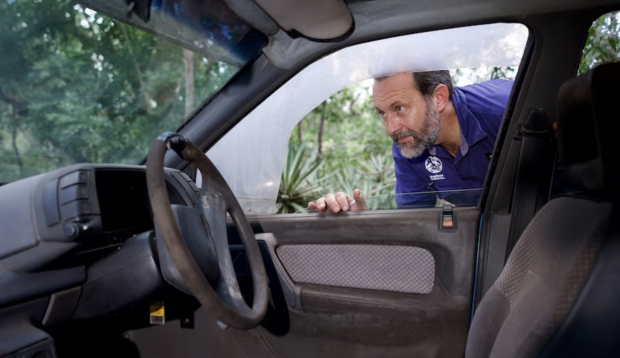
For Dr Nitschke, the acceptance of the taxi into the collection would be a fitting full circle for Max Bell: a last destination on the steely cabbie’s journey, and one that finally allows an end with dignity.
